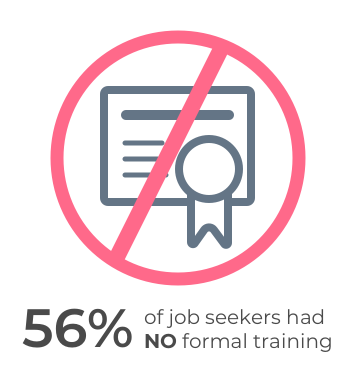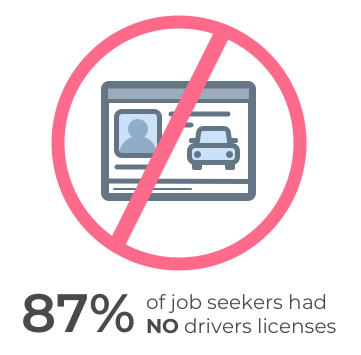Data stories
Discouraged Work Seekers Increase Durban's Unemployment
Rate in 2019 Q3.
Could Skills Play a Role?

Introduction
When taking into account discouraged work seekers, unemployment in Durban increased to its highest rate ever recorded. This is according to the latest unemployment figures released through StatsSA's Quarterly Labour Force Survey. This increased rate is no suprised given the state of the national and global economy. It is, nonetheless worth exploring this further, and in particular, looking at what peculiar challenges Durban faces in an attempt to address them.
What caused the peak in Durban's unemployment in Q3 2019?
Breaking down the increase in the employed
• Durban’s economy created 24,000 jobs in the third quarter of 2019. The number of people employed in Durban is now 1,2 million people; however this is 27,000 people less than the same time the previous year.
• Despite the increase in employment from Q2 to Q3, 13,000 more people were without jobs than in 2019 Q2 (if those that are unemployed, and not actively looking for work are considered).
• The number of people unemployed and looking for jobs, dropped by 1,000, while those who are unemployed but have given up hope of finding a job (i.e. not looking) have increased by 2,800.
• 30,000 more previously inactive people (e.g. students, home makers, the ailing) entered the workforce. This may have been the result of Spring graduations, with graduates entering the workforce. This may also explain the increase in unemployment, with the workforce being unable to absorb all new labour market entrants.
Employed and unemployed in Durban over time
Expanded unemployment at its highest ever
There are now more unemployed people in Durban ever recorded before. This includes both those actively looking for work, and those who have given up hope but are still available to work. This unemployment rate is also at its highest recorded (30.6%).
Unemployed in Durban by the expanded definition
Including discouraged work seekersAre skills a contributing factor?
• Aside from Durban, South Africa, and the world's ailing economies, trends continue to indicate a strong link between unemployment and a lack of skills in Durban; with a skills survey of job seekers at Sizakala Centres in Durban indicating that over half of all job seekers do not have skills (54.04%). Over 90% did not have formal qualifications after matric (some did not have a matric qualification at all), while some softer skills were lacking, with 88.64% not in possession of a driver’s license.
• The key issue over and above the state of the economy appears to be skills, which would make job seekers more agile and employable despite the dampened economy.
• A solution may lie in 4IR skills, numerous of which do not require a completion of formal education (e.g. coding), however, more investment in such institutions is required in Durban.
Training and skills
| Sector of training | In what sector have you received formal training? | Number of Responses |
|---|---|---|
| No skills sector |
56.05%
|
12399
|
| Other business activities and services |
9.11%
|
2090
|
| Building and construction |
6.59%
|
1512
|
| IT and internet |
3.90%
|
894
|
| Electriciy gas and water supply |
3.23%
|
741
|
| Other sectors |
21%
|
22358
|

Drivers Licenses
| Drivers license status | Driver's license ownership in job seekers in Durban |
Number of Responses |
|---|---|---|
| Driver's license |
10.65%
|
2444
|
| No driver's license |
88.65%
|
20333
|
| Unspecified |
0.71%
|
162
|

Conclusion
While the global and national economies are partially to blame for the increase in Durban's unemployment, a solutions oriented approach requires an understanding of reasons why much of the City's workforce remains chronically unemployable. A lack of relevant skills appears to be a critical blockage in the fight against unemployment, where formal skills are in high demand but not present enough in the City's job seekers. Partnerships between government, educational institutions, civil society and private sector are crucial in addressing this challenge, particularly where programmes and institutions can be developed around equipping Durban's workseekers with 4IR relevant skills.Make better informed decisions with cutting-edge economic insight
